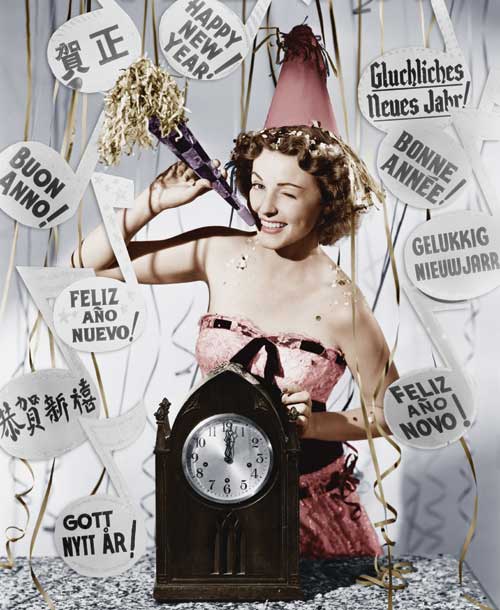Foreign Customs on New Year’s Eve

For the past dozen years, our family has welcomed the new year at our friends’ house. They belong to the Quaker meeting that I pastor, and are on their best behavior. I’d hate to think what would happen if I weren’t there to keep things under control. We cheat at board games, watch old episodes of Johnny Carson, play ping-pong, discretely gossip about people who aren’t there, and overeat. At the stroke of midnight, we blow horns, throw confetti on one another, then leave before we’re pressed into service to clean up the mess we’ve made.
When our children were small, we stayed home and slept through that golden moment. We would stir at midnight when the teenagers next door set off firecrackers, then fall back to sleep. When our children went to school and discovered their friends stayed up past midnight, the going to bed early stopped, and we had to look around for somewhere to go. Several churches in our town have New Year’s Eve parties, but that felt too much like work. If I were a mechanic, I wouldn’t want to welcome the new year underneath a car. We were looking for something mildly decadent, but not so naughty it would get me fired, so we jumped at the chance to attend our friends’ party, throw confetti, gossip, and toss back a stiff apple cider at the appointed hour.
I assumed most people in the world celebrated the new year the way Americans do, but they don’t. In Belgium, children write nice letters to their parents and read them aloud. I don’t know who started that practice, but I bet it wasn’t a kid. That sounds like an adult’s idea. People in France give presents to one another. A kid dreamed up that custom; I guarantee it. In Germany, people drop a lump of hot lead into cold water to see what shape it makes. They believe the resulting shape reveals their future. For instance, if the lead assumes the shape of a bullet, it means someone is going to shoot you. But if the chunk of lead looks like France or Poland, it means you’ll be invaded by Germans. I could never live in India, where on New Year’s Eve they’re expected to finish any uncompleted work. My life is a train of unfinished tasks, one railcar after another of half-finished efforts, with no caboose in sight.
Hungarians make effigies called “Jack Straws,” then burn them at midnight. The effigies symbolize everything bad that happened the previous year, so burning them wipes the slate clean. Theoretically, it’s supposed to bring them good luck in the upcoming year, though it never does since they always have to make effigies the next New Year’s Eve. If you have to continually repeat a tradition meant to ensure good luck, it means it doesn’t work.
In Scotland they clean their homes. My father’s family is from Scotland, but I must be adopted because I wouldn’t dream of cleaning my house on New Year’s Eve. I think my birth parents were from Australia, where they welcome the new year camping on the beach.
This is our first New Year’s with the kids grown and gone. People arch their eyebrows and say, “Oh, you can finally whoop it up.” But Quakers aren’t known for their whooping. We’re good for a whoop or two, then settle down pretty quickly.
When I was little, I would take a bath, put on my pajamas, lie on the living room floor with my brothers and sister, and watch Guy Lombardo at the Waldorf Astoria Hotel in New York City. My dad would light a fire in the fireplace, and my mom would make popcorn. We were each allowed one bottle of Coke. The glass ball would drop in Times Square. Mr. New Year’s Eve, Guy Lombardo himself, would pick up his baton and the Royal Canadians would swing into action with Auld Lang Syne. My father would grow misty-eyed.
“If we were still in Scotland,” he would say, “we’d be cleaning the house right now.”